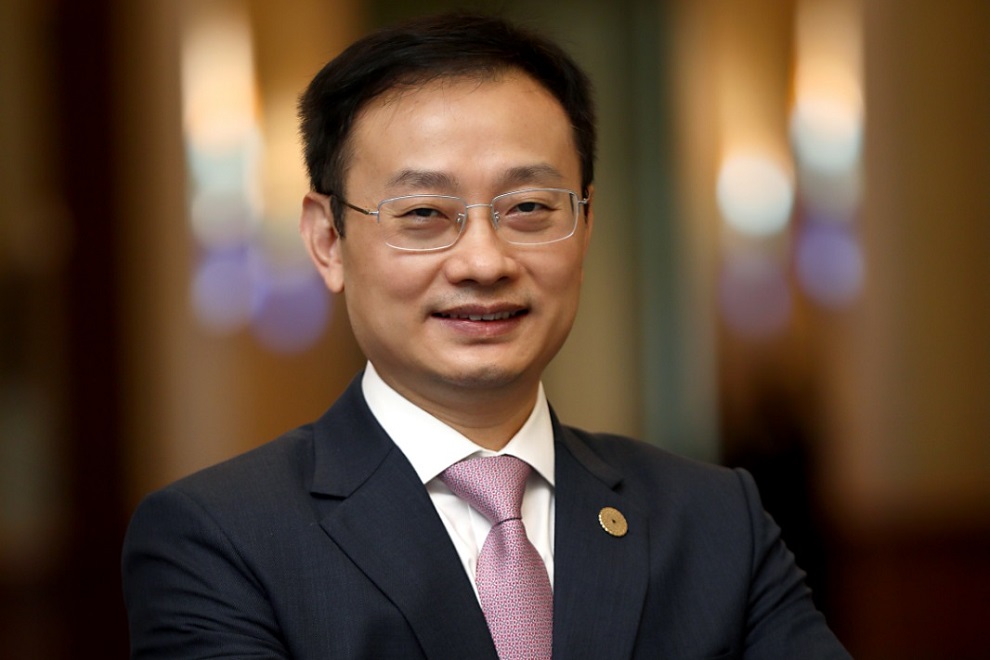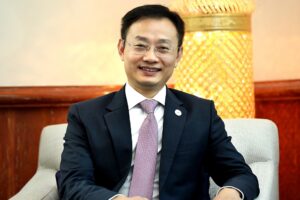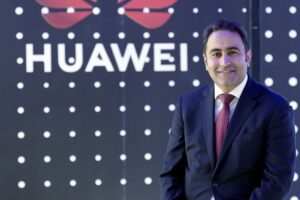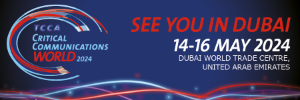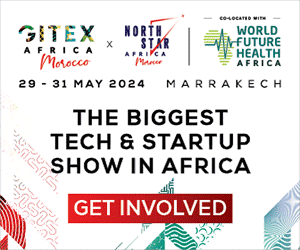Steven Yi, President of Huawei Middle East and Central Asia speaks to Teletimes International
By Khalid Athar
Khalid Athar: Having a long experience in ICT in MEA and other parts of the world, could you share your views on the digitalization journey of the Middle East region
Steven Yi: ICT presents an opportunity for Middle East countries to leapfrog legacy economic models and drive new and sustainable growth. Combined with a renewed focus on innovation backed by significant investment in R&D, it provides a clear path toward progress and future development for regional economies. ICT also enables industry digitalization, sparks innovation and makes other industries green.
Many countries have turned to digitalization and the digital economy to address socioeconomic challenges. And the results are clear: Throughout 2022, we have seen a marked increase in the adoption of digital technology and services among governments, industry organizations, enterprises, and consumers.
“Cloud is the foundation of digital transformation and provides the building blocks for other advanced technologies driving our digital world, such as AI, IoT, and more“
Steven Yi, President of Huawei Middle East and Central Asia
Investing in digital infrastructure is the cornerstone of accelerating digital transformation and promoting digital economy development. Accordingly, Huawei believes that regional countries are on the right track of Public-Private partnerships to leverage the advantages of professional companies to forge a sustainable national digital infrastructure operations mode through market-oriented services.
Governments can utilize digital infrastructure for local ICT ecosystem aggregation and open technology platforms and service scenarios to drive the growth of local ICT enterprises. Countries in the region are investing in enhancing their digital strategies, revamping their socio-economic development plans and national visions focused on digital transformation and racing to be the first to deploy the latest technological innovations. Huawei maintains long-standing partnerships to integrate digital and sustainability for a better, greener future. Huawei has helped millions of enterprises with digital transformation by building more than 1,500 networks in collaboration with carriers worldwide and connecting over 3 billion people worldwide.
K.A: What key technology currently plays a critical role in digitalization and building the digital economy?
S.Y: Innovations in 5G, cloud, AI and other new fields are pushing the digital economy into a new development phase. The Middle East is ahead of many other regions in many of these domains. Because of the fast roll-out of 5G, some regional countries are a reference point for how technology can help to advance the development of all industries, especially when integrated with technologies such as cloud and AI. They can build on this foundation to pioneer the next generation of ICT technologies, including 5.5G, cloud, AI, and more.
Huawei first proposed an outline for 5.5G in 2020, and 3GPP officially named the concept “5G-Advanced” in 2021. As an upgraded version of 5G, 5.5G features will power future industry scenarios such as the IoV, IoT, robotics, and manufacturing and serve as a key driving force of the digital economy. 5.5G will upgrade network capabilities by 10X, support 10 Gbps experience, and enable 100 billion connections and native intelligence for numerous services. In short, 5.5G is necessary to build an intelligent world.

“Cybersecurity challenges must be addressed through technological innovation, knowledge sharing, standards development, verification, and other internationally credited measures”
Steven Yi, President of Huawei Middle East and Central Asia
Cloud is the foundation of digital transformation and provides the building blocks for other advanced technologies driving our digital world, such as AI, IoT, and more. Huawei’s cloud strategy is built around Everything-as-a-Service. In the future, all devices, sensors, and all things will be connected, and all infrastructure and applications will be cloud-based. We believe all applications we can run on the cloud should be migrated to the cloud. Additionally, we need to embrace AI and let data play its part in supporting operational decision-making. When facing the intelligent world, the right strategy should be all-digital, all-cloud, AI-driven, and everything as a service, including Infrastructure as a Service, Technology as a Service, and Expertise as a Service.
HUAWEI CLOUD continues to evolve with an ever-increasing number of services. In 2022, Huawei Cloud invested US$100 million into upgrading the Huawei Cloud Developer Program. The program has attracted over 3,000 enterprises, produced over 2,300 joint solutions, and certified more than 16,000 developers. By the end of 2022, the number of Huawei Cloud developers worldwide had increased from 2.6 million to more than 4 million. In the Middle East, the cloud customer base more than doubled in 2022.
AI is a significant driving force enabling businesses to unleash their full potential. AI will be the foundation of the industrial sector’s unprecedented digital transformation and business innovation. It offers new paths toward growth for manufacturing, service, and other industries, reshaping the world economy and bringing new opportunities for societal development.
K.A: How important is it to maintain the highest level of Cyber security in line with international standards when handling accelerated technologies deployments such as 5G, AI, Cloud and big data?
S.Y: As the world grows more interconnected, digital, and intelligent, cyberspace is becoming an integral part of life, business, and the economy. The world’s data and networks must be secure to amplify the benefits of the digital economy. This is a challenge as the vast amount of personal and corporate data produced daily has exponentially expanded the attack surface that cybercriminals could effectively exploit.
Huawei believes that cyber security is a shared responsibility. Cybersecurity challenges must be addressed through technological innovation, knowledge sharing, standards development, verification, and other internationally credited measures. Huawei has a proven track record in cyber security globally. Over 70 cyber security certifications were awarded to Huawei, providing customers with internationally recognized security assurances.
We work with regional partners to build a robust regional cybersecurity foundation. Our collaborative approach to cybersecurity is demonstrated by our membership in the Organisation of the Islamic Cooperation – Computer Emergency Response Team (OIC-CERT). Huawei was part of the OIC-CERT 5G Security Framework Working Group to support delivering a robust 5G security and demonstrate ‘our vision of open collaboration to tackle security challenges.
The industry recognizes Huawei’s cybersecurity excellence. We were recently awarded the Network Security Innovator of the Year at the ITP.net Security Leadership Awards held against the backdrop of GISEC Global 2023 for our Multilayer Ransomware Protection Solution. Judges picked Huawei for developing the industry’s first Data Center Multilayer Ransomware Protection solution, transforming cyber security protection capabilities from passive response to proactive defense. Huawei participated at GISEC Global 2023 as the Lead Strategic Partner, displaying the diverse range of its latest cybersecurity solutions, innovations for digital transformation, and successful use cases.
We must continuously improve cyber security to safeguard the development of our digital economy, which entails both challenges and opportunities. That means building digital trust and making critical infrastructure both more secure and more resilient. That means guiding enterprises through the digital transformation process, implementing management and technical measures to control risks, ensuring compliance, and protecting both networks and data. Overall cyber security and privacy protection is about dealing with the daily details of good practice. It is not always exciting, but it does keep the world moving forward in a positive way.
K.A: How important is it to focus on green technologies development and carbon neutrality when planning to achieve more milestones in digital transformation? How about telecom network sustainability?
S.Y: ICT technologies are at the very core of the digital economy. They are what drive industrial upgrades and the business development of enterprises. Digitalization, intelligent transformation, and green development are the way forward.
The explosion of data in the digital era is straining the industry’s commitment to reducing its carbon footprint. According to third-party research, data traffic generated by digital services is expected to grow 13-fold over 2020 by 2030. Unless energy efficiency improvements are made, the ICT industry’s energy consumption and carbon emissions will see a 2.3-fold increase.
“The core of carbon neutrality is low carbon at the production end, electrification at the consumption end, and intelligence at the management end”
Steven Yi, President of Huawei Middle East and Central Asia
The core of carbon neutrality is low carbon at the production end, electrification at the consumption end, and intelligence at the management end. Huawei is working with regional partners to increase the proportion of electricity generated with green energy, improve the power consumption efficiency of various sectors, support the development of green energy, and achieve energy conservation, emission reduction, and OPEX savings.
Huawei Digital Power looks at five areas of business globally: Smart PV, data center facilities, mPower for electric vehicles, site power, and integrated energy solutions. By the end of 2022, Huawei Digital Power had helped customers generate 695.1 billion kWh of green power and save 19.5 billion kWh of electricity. These efforts have offset 340 million tons of CO2 emissions, equivalent to planting 470 million trees.
Apart from enabling industry digitalization and innovation, ICT can help other industries go green. Recently at COP27 in Egypt, Huawei spotlighted the “enabling effect” of ICT, which is “making other industries greener”. We noted that 5G, AI, data analytics and cloud computing would improve industrial processes in a way that cuts energy use and lowers carbon emissions. In the same way, ICT enables a smart streetlight to turn itself off when no one is around, 5G wireless base stations can automatically shut down when there is no data traffic, saving energy.
To this end, members of the ITU-T, including Huawei, have proposed a standard for measuring network energy use. Known as the Network Carbon Intensity energy metric, the standard was approved by ITU-T on October 19, 2022.
K.A: ICT talent is a cornerstone in the digital era. How important is nurturing local talent in realizing the ambitious targets of the ME countries’ national plans and visions?
S.Y: The importance of an effective talent development strategy for the region’s digital transformation cannot be overemphasized. While regional universities have expanded their ICT offerings, the demand for ICT skills is rising exponentially while new technologies are emerging daily. Therefore, enabling solid capacity-building for the youth in ICT is a prerequisite in today’s digital world, as is upgrading and upskilling for experienced hires or anyone considering a mid-career switch.
Huawei has a long and proud history of collaboration with governments, academia and industry to enrich the region’s IC talent ecosystem. CSR initiatives such as Seeds for the Future, the annual Huawei ICT Competition, Huawei ICT Academy, joint innovation centers, labs and other CSR initiatives empower thousands of Arab youth annually to supercharge their ICT careers. In the Middle East, Huawei has set up 186 Huawei ICT Academies, and more than 4,000 students have participated in the flagship program Seeds for the Future, while over 57,000 people have obtained Huawei certification. We also have trained over 150,000 ICT talents for the Middle East and are committed to achieving more in collaboration with our partners.
Developing a robust digital talent ecosystem, sharing ICT knowledge and skills, and helping universities cultivate digital talent will continue to be among out key targets.
K.A: With all the challenges Huawei is going through, there is still high confidence in maintaining your customer-centricity approach and your ability to continue delivering innovations up to your customers’ expectations. Can you tell us where this confidence comes from and how you see Huawei’s future in the region?
S.Y: Huawei recently released its 2022 Annual Report and we reported steady operations throughout 2022, having generated USD92.37 billion in revenue and USD5.12 billion in net profits. Huawei’s success has traditionally relied on its strong R&D foundation. The company’s R&D investment reached $23.22 billion in 2022, representing 25.1% of its annual revenue and bringing its total R&D expenditure over the past ten years to more than USD 140.55 billion.
Huawei’s ongoing innovation in ICT standards over the past 20 years has led to many high-value technologies and patent portfolios in domains like 5G, Wi-Fi, mobile communications, short-distance communications, and audio/video codecs. By the end of 2022, Huawei held over 120,000 active patents. Hundreds of companies have already signed agreements or set up patent pools with Huawei to use our patented technologies.
This same commitment to innovation will help Huawei face its challenges while continuing to deliver value to customers, partners, and the communities we serve.



